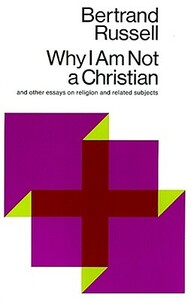Take a photo of a barcode or cover
117 reviews for:
Why I Am Not a Christian: And Other Essays on Religion and Related Subjects
Bertrand Russell
117 reviews for:
Why I Am Not a Christian: And Other Essays on Religion and Related Subjects
Bertrand Russell
challenging
reflective
slow-paced
An excellent refutation of organized religion as it applies to morality. Russell articulates many skeptics' dubious opinions of organized religion's benefits to society balanced with their oppressive, restrictive, and bigoted attitudes. His essays on sex education and free thought were most salient for me and speak to the ills our society generates in the name of "decency" or being "nice". Russell has a healthy amount of cynicism but doesn't allow this to blur his analytical precision in his essays. A very worthy example of Russell's writing and one I would encourage those who are burdened with free thought to read.
challenging
informative
inspiring
reflective
slow-paced
Russell's writing is spectacular, and the topics he writes about genuinely sound like they could have been written last week instead of nearly a century ago.
challenging
informative
inspiring
reflective
medium-paced
informative
reflective
medium-paced
Não pensaríamos em estudar um ninho de formigas para saber que formigas cumpriam os seus deveres, e tão-pouco pensaríamos em selecionar as formigas preguiçosas e pô-las na fogueira.
Uma colecção de ensaios de Russel onde nos é dado a conhecer o que pensa o autor sobre a Religião, Deus, moralidade, etc...
Particularmente interessante e actual é o apêndice onde é narrado de forma sucinta a perseguição religiosa que Bertrand Russel sofreu ao ser nomeado professor no City College de Nova York.
challenging
funny
informative
inspiring
reflective
slow-paced
challenging
informative
reflective
medium-paced
Disappointing. The arguments are a little old, and I was too familiar with them. I did not learn much from this book.
I was disappointed that he did not look at what I consider to be one of the strengths of religion-metaphor. He quickly dismissed the importance of psychological benefits of religion, as irrelevant if the dogma is untrue. But, some religions consider the metaphor as key. For example, Buddhism and Utiliarian-Unitarianism. Plenty of members of those religions are atheists and focus on the metaphors.
I was disappointed that he did not look at what I consider to be one of the strengths of religion-metaphor. He quickly dismissed the importance of psychological benefits of religion, as irrelevant if the dogma is untrue. But, some religions consider the metaphor as key. For example, Buddhism and Utiliarian-Unitarianism. Plenty of members of those religions are atheists and focus on the metaphors.
"One of the works of literature for which [Russell] was awarded the Nobel Prize is a widely read essay first delivered as a lecture in 1927 entitled, 'Why I Am Not a Christian.' ...I haven't forgotten it yet, and I have promised myself that I never will. ...If you were to read his essay, and in the interest of open-mindedness I would urge you to do so, you would find that Bertrand Russell, who is one of the world's foremost logicians as well as a philosopher and mathematician, undoes with logic that is beyond dispute the first-cause arguement, the natural law arguement, the arguement from design, the moral arguements for a diety, and the arguement for the remedying of injustice." ~Philip Roth, Indignation
It is of some importance to note that this is a collection of essays spanning, in my edition, some 267 pages. The title piece, 'Why I Am Not a Christian,' is just 20 pages, leaving roughly 92.5% of the volume for other engrossing bits such as 'Life in the Middle Ages,' 'The Fate of Thomas Paine,' and 'Our Sexual Ethics.' All of which I found fascinating!
Russell's assertions on religion and related topics aren't necessarily earth shattering, at least not anymore. I think that only goes to show what an enormous influence he has had on modern secularism and free thought. You can hear his words, rephrased and reiterated, in the works of Christopher Hitchens, Jerry Coyne, and Victor Stenger (just to name a few).
"The attitude that one ought to believe a proposition, independently of the question whether there is evidence in its favor, is an attitude which produces hostility to evidence and causes us to close our minds to every fact that does not suit our prejudices." ~B.R.
Speaking for myself, I made my break with religious dogma years before I had ever heard of Bertrand Russell, so it should come as no surprise to anyone who knows me that I find his wisdom and scrupulous logic life-affirming. His reputation for brilliant and intelligent 'heresy' is justly deserved and his work is as relevant now as it was when it was written almost a century ago. In fact, in this era of American oligarchy and the increasing politicalization of faith, it is possible that Russell is more relevant now than ever.
"One is often told that it is a very wrong thing to attack religion, because religion makes men virtuous. So I am told; I have not noticed it." ~B.R.
It is of some importance to note that this is a collection of essays spanning, in my edition, some 267 pages. The title piece, 'Why I Am Not a Christian,' is just 20 pages, leaving roughly 92.5% of the volume for other engrossing bits such as 'Life in the Middle Ages,' 'The Fate of Thomas Paine,' and 'Our Sexual Ethics.' All of which I found fascinating!
Russell's assertions on religion and related topics aren't necessarily earth shattering, at least not anymore. I think that only goes to show what an enormous influence he has had on modern secularism and free thought. You can hear his words, rephrased and reiterated, in the works of Christopher Hitchens, Jerry Coyne, and Victor Stenger (just to name a few).
"The attitude that one ought to believe a proposition, independently of the question whether there is evidence in its favor, is an attitude which produces hostility to evidence and causes us to close our minds to every fact that does not suit our prejudices." ~B.R.
Speaking for myself, I made my break with religious dogma years before I had ever heard of Bertrand Russell, so it should come as no surprise to anyone who knows me that I find his wisdom and scrupulous logic life-affirming. His reputation for brilliant and intelligent 'heresy' is justly deserved and his work is as relevant now as it was when it was written almost a century ago. In fact, in this era of American oligarchy and the increasing politicalization of faith, it is possible that Russell is more relevant now than ever.
"One is often told that it is a very wrong thing to attack religion, because religion makes men virtuous. So I am told; I have not noticed it." ~B.R.





